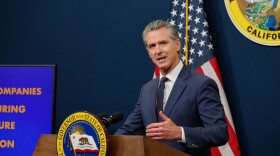You can tell the health care debate is reaching a critical point just by the number of ads flooding the airwaves of local and cable television.
But how accurate are those 30-second attempts to boil down a year's worth of debate? We decided to put a few to the test.
Here, for example, is a section of a spot being financed by the American Federation of State County and Municipal Employees (AFSCME), and the liberal group Americans United for Change: "Health insurance companies just announced more huge rate increases — some as high as 75 percent. Insurance companies are out of control. They deny our claims, drop us when we're sick, and pay their CEOs' huge bonuses. They refuse to cover people who have pre-existing conditions, leaving families in financial ruin."
Technically most of those statements are true. But they only apply in full to a small portion of the insurance market — people who buy their health insurance themselves. That's about 14 million people. Most people — more than 250 million — get their insurance at work. And there is already a federal law that bars most health insurance discrimination in group insurance plans.
The National Republican Campaign Committee, which is responsible for electing Republicans to the House of Representatives, is also running an ad aimed at Democrats who have been wavering about whether to vote for the bill that the Senate passed in December. This particular version is aimed at Rep. Alan Mollohan (D-WV): "It's March, and that means it's madness. But not basketball madness. It's madness in Washington. Democrats like Alan Mollohan are backing a corrupt bill: pork barrel spending; special deals for Nebraska, Florida, Louisiana. The press says it's about bribery behind closed doors."
This one sort of speaks for itself. Now the Senate bill does, indeed, include special deals for Florida, Nebraska and Louisiana. But the bill the House will vote on after it approves that Senate bill will get rid of the deal for Florida. It will give Nebraska's deal — for expanded federal funding for Medicaid — to every state. Louisiana's deal, which had to do with a funding quirk as a result of Hurricane Katrina, gets to stay.
Another ad now running comes from another pair of liberal groups, the Progressive Change Campaign Committee and Democracy for America. It begins with House Speaker Nancy Pelosi saying she is sad that there is no public health insurance option in the bill, but that "it isn't in there because we don't have the votes."
The ad goes on to cite a letter signed by 41 senators who say they want to include a public plan in the so-called "fix it" bill. Then, one by one, it shows another 10 who say they'll also support a public plan, bringing the total to 51 — including Alaska's Mark Begich, who says, "If it's part of the reconciliation bill and I like it, I'll vote for it," and Tom Harkin, who says flatly, "I'm for a public option, always have been."
The end of the ad asks viewers to urge Speaker Pelosi to reconsider the public option. But even some of the senators expressing support for the public option in the ad have said they don't support trying to add it back into the bill.
Finally, here's a clip from an ad from an employer group that is funded by the U.S. Chamber of Commerce, which is among the bill's most ardent opponents: "We thought Washington understood. But now Congress is trying to use special rules to ram through their same trillion-dollar health care bill. Billions in new taxes. More mandates on business. Health costs will go even higher, making a tough economy even worse."
Special rules? Well, they're rules that have been long used by both parties. And the Congressional Budget Office says the Senate bill would cut health costs, not raise them — although it would raise taxes, at least for some people.
So are any of the dozens of ads airing these days entirely accurate? Yes, a few. Actually, we couldn't find anything to correct in ads being run by two of the most outspoken opponents in the health care fight — the insurance industry trade group AHIP, and the consumer group Health Care for America Now.
Copyright 2022 NPR. To see more, visit https://www.npr.org. 9(MDAzMjM2NDYzMDEyMzc1Njk5NjAxNzY3OQ001))





